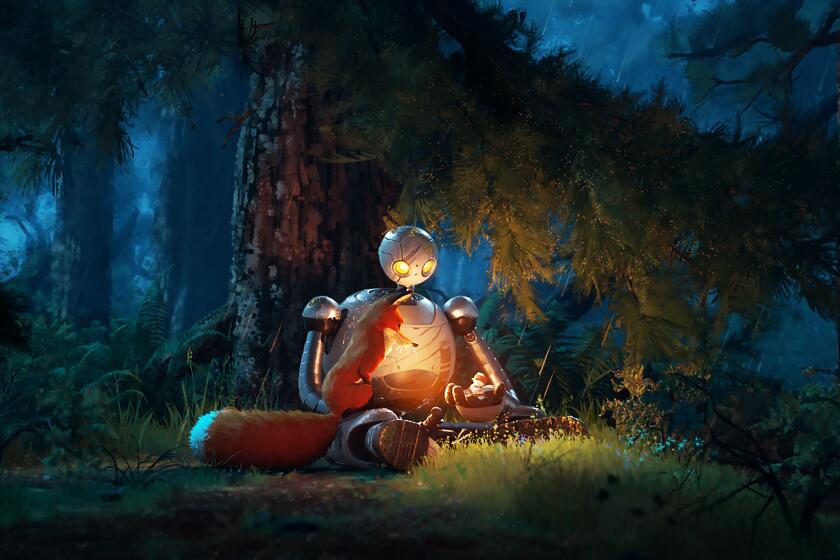Amnesia, mon amour
Ah, amnesia. It’s been a staple in films since, well, longer than I can remember. There was a bit of a lull in the memory-loss tale for a few years there in the ‘90s, but no more. Whether by accident, trauma or design, memory loss is once again a favorite concept among contemporary moviemakers.
The film that seemed to start the modern amnesia ball rolling is “Memento,” released in 2000, in which a man with no short-term memory attempted to find his wife’s killer, in a story that moved backward.
More recent examples include “Paycheck,” “Butterfly Effect,” “Gothika,” “50 First Dates” and the animated “Finding Nemo.” “Eternal Sunshine of the Spotless Mind” opened Friday. This year, we’ll see “The Notebook,” the remake of “The Manchurian Candidate” and the sequel to “The Bourne Identity,” titled “The Bourne Supremacy.” What’s more, many of those films address issues of love alongside the amnesia, which tends to complicate matters. After all, memory is inextricably tied up with our identity. So if we don’t know who we are, how do we know whom we are drawn to? How can we love a partner who has no sense of identity? Can love exist if we don’t remember it?
Directed by Michel Gondry and written by Charlie Kaufman (“Adaptation,” “Being John Malkovich”), “Eternal Sunshine” uses a sci-fi gimmick as a way to look at love and loss. Thanks to the creation of a machine that erases unwanted memories, Clementine (Kate Winslet) decides to remove all existence of her now-painful relationship with Joel (Jim Carrey) from her mind. When he learns of this, he angrily follows suit.
But just as the worst, most recent memories disappear from his mind, he finds himself remembering better times and realizes he doesn’t want them to be erased. He battles to hold on to those moments, in scenes that are surprisingly gripping. Ultimately, “Eternal Sunshine” considers the futility of trying to hold on to any moment other than the present and whether love is worth the pain it can bring. And despite its futuristic trappings, the film depicts one of the more realistic love stories in recent memory.
If anything, one might think memory loss would affect one’s chances for love negatively, but in a number of films the opposite is true. Amnesia is almost presented as an aphrodisiac, as characters find a freedom to love that they didn’t have previously. In “The Bourne Identity” you’d think Jason Bourne (Matt Damon) would have enough on his mind between the amnesia and the astonishingly innate ability to neutralize all enemies, but he manages to find the time to fall hard for the stranger Marie (Franka Potente).
In the 2002 Finnish film “The Man Without a Past” by Aki Kaurismaki, a man is beaten and left for dead, wakes with no idea of his identity, and yet seems more determined to win the heart of a kindly Salvation Army worker than to find out who he is.
If I had understood “Mulholland Dr.” at all, I’d include that as another example, since Camilla’s (Laura Harring) amnesia is tied up in a love story with Diane (Naomi Watts) -- I think.
Older titles of this “free to be, who are we?” ilk include “Desperately Seeking Susan” and “Overboard,” where women forget who they are only to find the love they’ve never had before. Their amnesia serves to release their inhibitions and lets them feel like their real selves for the first time.
In “50 First Dates” Lucy (Drew Barrymore) is afflicted with short-term memory loss -- she relives the same day over and over. As a result, she can’t remember her suitor Henry (Adam Sandler), but she can’t forget him either. Despite her ailment, she paints his face over and over. Love is stronger than memory.
Even “Finding Nemo” adds an element of love and longing to Dory’s amusing short-term memory loss. In a poignant moment near the end of the film, the blue fish (voiced by Ellen DeGeneres) asks Marlin, “Please don’t go away.... I just, I remember things better with you. I do.... I look at you, and I, and I’m home.” Her feelings for him have managed to improve her memory.
Perhaps these lose-memory, find-love stories are so popular because the romantic genre needs all the help it can get. Cinderella stories and star-crossed lovers can only be redone so many thousands of times. Throwing in a few mind games freshens up the plot. After all, “50 First Dates” was basically the “cute meet” done over and over again. And we always want to believe love can conquer anything -- even brain damage.
Memory loss can even serve as a metaphor for the act of falling in love itself. Love can certainly feel like getting conked on the head. It can mess with the mind like nothing else. The victim is helpless in its grip. What more powerful way to express that feeling than with the ultimate loss of control -- over one’s very identity?
The concept certainly makes for a nice fantasy: If we could only shed our experiences we’d be able to start fresh. We’d be better, purer people, worthy of true love, great adventure, romance without baggage.
But that baggage -- that memory -- makes us who we are. We can’t be that free in real life. Experience, and memory of that experience, sullies us. We are as trapped by our identities as we are dependent on them. That too is reflected on film, most often in dramas and tragedies.
“The Notebook,” which opens in July, addresses the subject most literally, looking at love in the face of Alzheimer’s. In “The Manchurian Candidate,” the original anyway, Shaw’s manipulated mind and his love for his bride crash together in a most horrific fashion. In “Butterfly Effect,” which combines memory loss with time travel, the more Evan (Ashton Kutcher) tries to alter his memories, the worse the outcome for those he loves. In “Memento,” Leonard’s (Guy Pearce) love for his wife spurs his deadly act of revenge, because he’s forgotten what really caused her death.
In light of all this suffering, no wonder moviegoers like those conk-on-the-head fantasies. Poor cinematic amnesiacs, limited to either delightful liberation or dire consequences. It’s the rare film, like “Eternal Sunshine,” that’s comfortable exploring the area in between.
Whatever the incarnation, the memory-free lover is sure to be with us for a while. Then again, maybe it’s time to bring back another old standby. Wise aliens, perhaps. With amnesia. In love.
Lisa Rosen can be contacted at calendar@latimes.com.
More to Read
Only good movies
Get the Indie Focus newsletter, Mark Olsen's weekly guide to the world of cinema.
You may occasionally receive promotional content from the Los Angeles Times.








